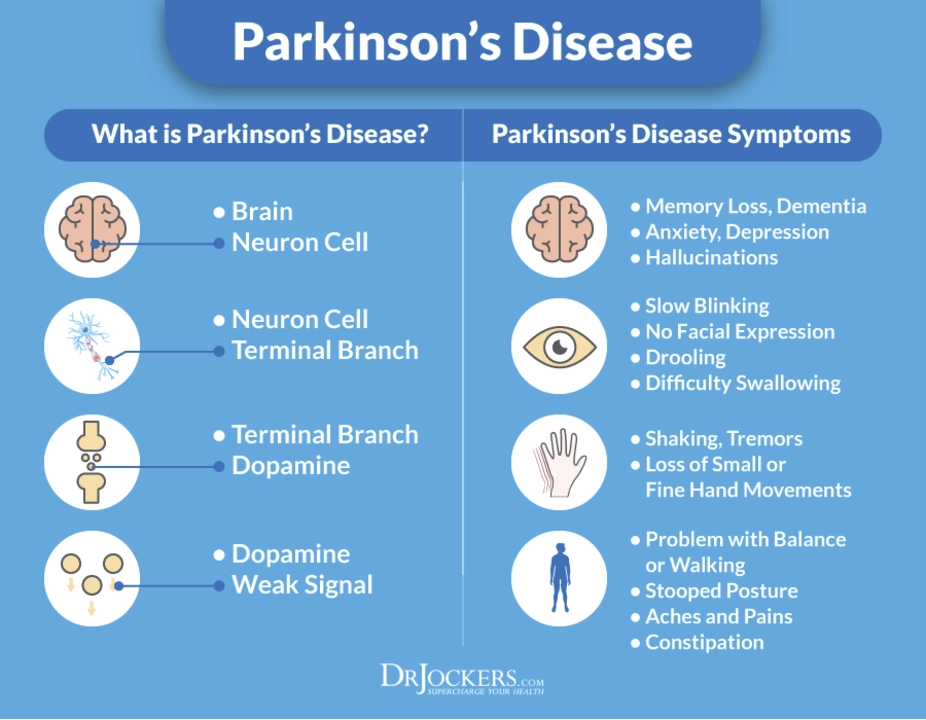Understanding Parkinson's Disease
In order to fully comprehend the importance of early detection and diagnosis in Parkinson's Disease, it is crucial to first understand what Parkinson's Disease is. Parkinson's Disease is a progressive neurological disorder that primarily affects movement. It occurs when certain nerve cells in the brain, called neurons, break down or die. These neurons are responsible for producing dopamine, a chemical that plays a role in controlling movement. As the disease progresses, the amount of dopamine produced decreases, resulting in the symptoms of Parkinson's.
Recognizing Early Symptoms of Parkinson's Disease
Early detection of Parkinson's Disease is essential for proper treatment and management of the condition. To achieve this, it is crucial to be aware of the early symptoms of the disease. These symptoms can include tremors, slowed movement (bradykinesia), rigid muscles, impaired posture and balance, loss of automatic movements, speech changes, and writing changes. It is important to note that these symptoms may vary from person to person and may be subtle at first, making early detection challenging.
Importance of Early Detection in Parkinson's Disease
Early detection of Parkinson's Disease is vital for several reasons. First, it allows for prompt treatment, which can help manage symptoms and maintain a higher quality of life. Second, early detection may provide opportunities for participation in clinical trials, which can lead to advancements in treatment options. Lastly, early diagnosis allows individuals and their families to plan and prepare for the future, both emotionally and financially.
How Early Detection Influences Treatment Options
The sooner Parkinson's Disease is diagnosed, the more treatment options are available for patients. Early treatment can help manage symptoms, delay disease progression, and improve overall quality of life. Some of the common treatment options include medications, lifestyle changes, and surgical interventions such as deep brain stimulation. By detecting the disease early, healthcare providers can tailor a treatment plan that best suits the patient's needs.
Screening Tools and Tests for Parkinson's Disease
There is no single test that can definitively diagnose Parkinson's Disease. However, there are several screening tools and tests that can help healthcare providers make an accurate diagnosis. These may include neurological examinations, assessment of motor symptoms, imaging tests such as MRI and PET scans, and blood tests. Early detection relies on a combination of these tests and a thorough evaluation of the patient's medical history and symptoms.
Role of Genetics in Parkinson's Disease
Research has shown that genetics can play a role in the development of Parkinson's Disease. In some cases, specific gene mutations have been identified that can cause the disease. In other cases, having a close relative with Parkinson's Disease can increase an individual's risk of developing the condition. Understanding one's genetic risk factors can be helpful in early detection and intervention.
Importance of Patient Awareness and Education
Patient awareness and education are crucial in the early detection of Parkinson's Disease. Individuals need to be informed about the early symptoms of the disease and the importance of seeking medical attention if they suspect they may have the condition. Additionally, education about the disease can help reduce fear and misconceptions, empowering patients to take control of their health and actively participate in their treatment plan.
Support for Patients and Families
Receiving a diagnosis of Parkinson's Disease can be overwhelming, both for the patient and their family. It is essential to have access to support resources, such as support groups, counseling, and educational materials, to help cope with the emotional impact of the diagnosis. Early detection provides more time for patients and their families to access and benefit from these support resources.
The Future of Parkinson's Disease Treatment and Research
Research into Parkinson's Disease is ongoing, with the goal of developing new treatments and ultimately finding a cure. Early detection and diagnosis play a significant role in this research, as it allows for a better understanding of the disease's progression and provides opportunities for patients to participate in clinical trials. As our knowledge of Parkinson's Disease continues to grow, so too does the potential for improved treatment options and outcomes for patients.
Conclusion
Early detection and diagnosis of Parkinson's Disease are crucial for better management of the condition, improving quality of life, and advancing treatment options. It is essential for individuals to be aware of the early symptoms and the importance of seeking medical attention if they suspect they may have the disease. With continued research and advancements in treatment, there is hope for a brighter future for those affected by Parkinson's Disease.




Sarah Seddon
Your post shines a bright beacon of hope for anyone walking the early‑stage Parkinson’s path!
Ari Kusumo Wibowo
Early detection isn’t just a buzzword; it opens doors to therapies that can actually slow the motor decline.
If a neurologist catches the tremor or subtle gait shift before it solidifies, medication can be fine‑tuned to preserve function.
Moreover, patients become eligible for cutting‑edge clinical trials that test neuroprotective agents.
In short, the sooner the diagnosis, the more leverage you have over the disease trajectory.
Hannah Gorman
The concept of early detection in Parkinson’s disease extends far beyond merely spotting a tremor.
It begins with a systematic assessment of subtle motor cues such as reduced arm swing, micro‑bradykinesia, and diminished facial expression.
These signs often escape the casual observer but can be quantified with wearable sensors that track movement patterns over days.
In parallel, non‑motor symptoms like hyposmia, constipation, and REM‑sleep behavior disorder may precede motor onset by years.
Identifying these prodromal features provides a critical window for intervention before irreversible neuronal loss accumulates.
Genetic screening for mutations in LRRK2, PARK7, and SNCA further refines risk stratification, allowing families to seek counseling early.
When a high‑risk individual is flagged, clinicians can employ advanced imaging modalities such as DaT‑SPECT to visualize dopaminergic deficit.
Combined with detailed neuropsychological testing, this multimodal approach yields a more confident diagnosis.
Early diagnosis also empowers patients to join clinical trials testing disease‑modifying therapies, which often exclude late‑stage participants.
Access to such trials can accelerate the development of neuroprotective drugs that aim to preserve dopamine‑producing neurons.
From a therapeutic standpoint, initiating levodopa or dopamine agonists at the first sign of impairment can mitigate symptom burden.
Adjunctive strategies like high‑intensity exercise, physiotherapy, and speech training are most effective when started early.
These interventions not only improve quality of life but may also exert neuroplastic benefits that slow progression.
Financially, early engagement with healthcare providers allows for better planning of insurance coverage, assistive devices, and support services.
Ultimately, the ripple effect of early detection reshapes the patient’s trajectory, the family’s preparedness, and the scientific community’s understanding of Parkinson’s disease.
Tatiana Akimova
You’re absolutely right-early screening isn’t just a medical checkbox; it’s a lifeline that fuels hope and drives real action.
Let’s keep championing proactive check‑ups!
Calandra Harris
America is already leading the fight against Parkinson’s and we don’t need anyone else telling us how to research it.
Dan Burbank
While the discourse rightly celebrates pharmacologic advances, it neglects the profound philosophical implications of redefining identity through movement.
The reductionist view that dopamine replacement is the panacea betrays a shallow understanding of neurobiology.
A more nuanced approach would integrate neuroethical considerations alongside clinical outcomes.
Only then can we honor the person behind the symptom.
Anna Marie
Thank you for highlighting the broader context.
I appreciate your thoughtful analysis and agree that a balanced perspective is essential for patient‑centered care.
Abdulraheem yahya
From a global health standpoint, early detection protocols should be standardized across borders to ensure equity.
Community health workers can be trained to recognize prodromal signs, bridging the gap in underserved regions.
Such initiatives not only improve outcomes but also generate valuable epidemiological data.
Collaboration between neurologists, primary care, and patient advocacy groups is the linchpin of success.
Investing in these networks now will pay dividends in reduced disease burden worldwide.
Preeti Sharma
Even if early detection sounds beneficial, not all patients need to be labeled prematurely.
Sometimes the fear of a diagnosis can outweigh its practical advantages.
Ted G
The pharma industry quietly steers research funding toward drugs that profit them, sidelining true preventive measures.
Early detection becomes a marketing ploy rather than a patient priority.
Stay vigilant.
Miriam Bresticker
Ths s whre the mdcl ndustry hides thir trcks 😈🤖
Claire Willett
Early detection = increased therapeutic windows; biomarker integration essential.